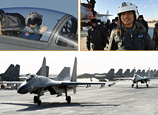
"In China, taxation has so far failed to shape a healthy income distribution, which it is supposed to do," Gan said.
But it is not only about how the tax is collected, but how it is spent. Wang Yukai, vice-chairman of the China Society of Administrative Reform, said that education, medical and social security accounts for 56 to 70 percent of government spending in Western countries, while in China, only 28.8 percent is spent on these areas.
Gao from the China Society of Economic Reform said one-third of China's occupational disparity could be attributed to monopolies, so reform in the railway, petroleum, electricity and telecommunication sectors is urgently needed. Most experts agree that SOEs' dividends to the government should be raised.
Many other suggestions were raised at the forum, including the development of the service sector, the establishment of a wage negotiation mechanism and increasing the transparency of the public budget and assets.
However, experts warned that vested interests might jeopardize much-needed reform.
"The inequality of income distribution is the result of the twisted interests configuration. To cultivate fairer income distribution, power should be tamed," said Wang Yukai from the China Society of Administrative Reform.
zhengyangpeng@chinadaily.com.cn















 'Devil' foreign instructors at Chinese bodyguard training camp
'Devil' foreign instructors at Chinese bodyguard training camp


![]()
